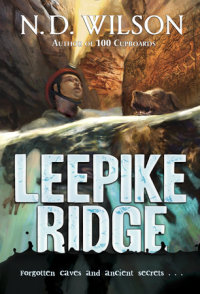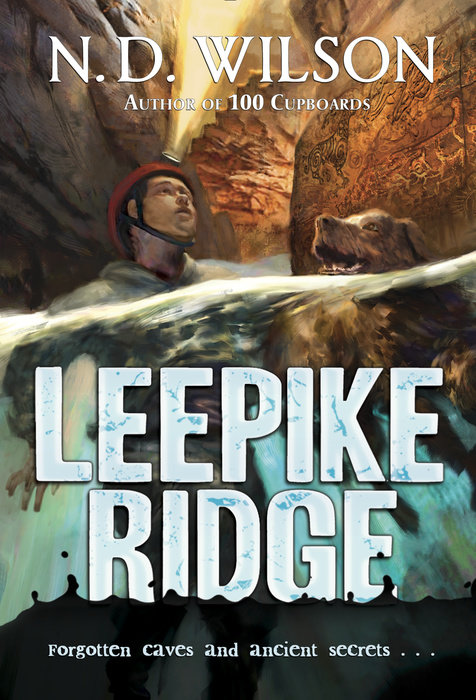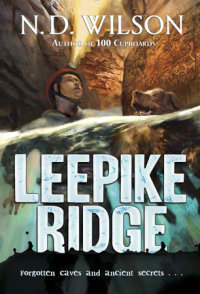Leepike Ridge
Before he wrote the bestselling 100 Cupboards trilogy and Ashtown Burials series, N. D. Wilson delighted readers with his first unforgettable action-adventure story of survival. . . .
Thomas Hammond has always lived next to Leepike Ridge, but he never imagined he might end up lost beneath it! The night Tom’s schoolteacher comes to dinner and asks Tom’s mother to marry him, Tom slips out of the house and escapes down a nearby stream on a floating slab of packing foam. The night and stars lull Tom to sleep, and when he wakes, he has ridden his foam raft all the way to the ridge, where the stream dives underground. Flung over rapids and tossed through chasms, Tom finally hits shore, sore but alive. What Tom finds under Leepike Ridge—a dog, a flashlight, a castaway, a tomb, and buried treasure—will answer questions he hadn’t known to ask, and change his life forever. Now, if only he can find his way home again. . . .
In the grand tradition of Robinson Crusoe, Hatchet, and Tom Sawyer, N. D. Wilson’s first book for young readers is a remarkable adventure, a journey through the dark and back into the light.
A New York Public Library 100 Titles for Reading and Sharing
“This is a ripping good adventure yarn. . . . Here’s the perfect remedy for any summer that’s been disappointingly short on thrills.”—The Bulletin of the Center for Children’s Books, Starred
“Wilson’s debut is a literate, sometimes humorous page-turner in the classic tradition. Well-read adventure lovers are in for a treat looking for echoes of The Odyssey and Tom Sawyer.”—Kirkus Reviews
“Tom’s adventures have several literary ancestors, including Tom and Huck in the cave, and the inventive Swiss Family Robinson, but this is solidly set in the present, standing on its own with well-crafted suspense and fascinating survival detail. . . . [M]iddle-grade readers will also relish the physicality of the journey: underwater swims, tight passages, and rock climbing. . . . [An] appealing and easy-to-booktalk package.”—Booklist
“Wilson sets the scene vividly, from Tom’s home to the labyrinth of tunnels and caverns under the mountain, and the central characters’ emotional lives develop both naturally and affectingly. [Readers] will appreciate both the fast-paced adventure and Tom’s determination to make the impossible journey back home.”—The Horn Book Magazine
“Wilson’s rich imagination and his quirky characters are a true delight.”—School Library Journal
An Excerpt fromLeepike Ridge
In the history of the world there have been lots of onces and lots of times, and every time has had a once upon it. Most people will tell you that the once upon a time happened in a land far, far away, but it really depends on where you are. The once upon a time may have been just outside your back door. It may have been beneath your very feet. It might not have been in a land at all but deep in the sea's belly or bobbing around on its back.
In this case it was in a land, for the most part. If you know of a valley where a small mountain peak once shaped like a crescent moon has tumbled down and disturbed the old willow trees growing beside a slow stream, then this story does not begin far, far away, and you've probably already heard it. But if you, like me, had to be told about this valley and the stream and the old, dry house chained to the top of the enormous rock beside the foot of the mountain, then this story does begin once upon a time in a land most definitely far, far away. Anyone close to this valley is sure to have heard of it.
Our story had already begun when the dust-covered delivery truck found the gravel road leading into the valley and followed it to its end beside the old willow rock. Two men got out and glared at the wooden stairs that crawled up to the house.
"Don't know what sort of people would build up there," the driver muttered.
"People who liked rocks, maybe. Or views."
"Or stairs."
Thomas Hammond, who was down by the stream with a red plastic cup full of leeches, heard them and turned to watch. They fished the large refrigerator box out of the back of the truck and strapped thick belts beneath thicker bellies, preparing to tote it to the top, two more deliverymen in a long history of delivery-men who would sweat and curse their way up the long, curving stairs. Finally, at the top, his mother greeted them and held the kitchen door open as they squeezed the box inside.
Tom had traveled around the sun eleven times when the delivery truck brought his mother's newest fridge, but a number doesn't really describe his age. His father had been gone for three years, and that made him feel older. He was the sort of boy who had many friends when he was at school, but what they knew about him was limited to his freckles, brown hair, long arms, and theclenched determination that settled onto his face when he was angry or competing. His smile, which was wide and quick, was always surprising, and his laugh, which lived in his narrow belly, was unpredictable. In games, any games, he was the first to dive for a ball, to slide on concrete, or to get a mouthful of dirt. He was taller than many of the boys in his class, but not the tallest, and he always seemed to have scabs.
Wait for the rest of the story, and you will know him better when I am done.
People thought Tom's house was chained to the top of the rock for a reason. Some said the first house in the valley had been built down by the stream and that the spring floods had washed it away. The second house, they said, had been built on top of the rock, but one of the big summer thunderstorms had blown it off. So the third house had been chained to spikes bored deep into the stone. But no one really knew why or when the house had been built, only that it
was there now and it had stayed put through life-times, though occasional electrical surges were hard on lightbulbs and appliances. The lightbulbs were easy to replace and the appliances were usually under warranty, so Tom's mother, Elizabeth, didn't mind. She didn't have to carry the new ones up the stairs.
When the truck had gone and the dust had settled, Tom dumped forty-seven confused leeches onto the bank, where he thought the birds would find them and be pleasantly surprised. Cup in hand, he jumped through the long grass and ran up the stairs to look at his mother's shiny new refrigeration. At the top he found the box. It was lying on its side, carefully arranged and waiting for him. He bent over and looked in. A long brick of white foam filled the bottom, and a small stack of cookies sat on it, allthe way at the end. Why? Tom wondered. Why does she think I still want to play in boxes?
Tom got down on his knees and retrieved the cookies. Back on his feet, he ate thoughtfully as he kicked at the fridge box and watched it skid across the rock. He kicked again, and the box tumbled down the rock and out onto the breeze. Tom watched plastic packing bags slip out, followed by the large piece of foam. The box bounced in the gravel drive and rolled into the long grass, but the foam floated nicely, clearing the first willow trees. The plastic bags disappeared.
"Hey!" his mother called from inside. "You'd better get that all picked up before some duck chokes on it! Come in and see the fridge!"
"We don't have ducks," Tom said. He stared at the last cookie in his hand, counted the chocolate chips, and then slid the whole thing into his mouth.
It was a nice fridge, too big for the corner of the kitchen where it would live out its electrically dangerous life. It was black and shiny, in sharp contrast to the dingy kitchen, and it had water and ice in the door. The last two fridges had both had the water and ice dispensers in the door but had never dispensed either one. They wouldn't work without a water line, and a water line had never been run.
"Well, you can head back out," Elizabeth said when the tour was over. "Try not to be too long, though. Jeffrey is coming to dinner, and I'll need help setting." She gave him half of a wide smile. "And see if you can track down all that trash you just spread through the valley."
She pushed her blond hair behind her ears and turned back to the pile of potato peels in the kitchen sink. Tom stood at the door, looking back at his tall, slender mother with her hands full of potato. He usually liked to watch his mother cook, but he didn't like watching her cook for Jeffrey.


